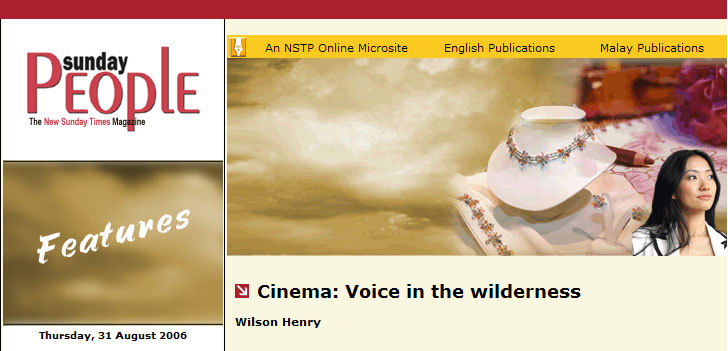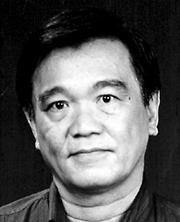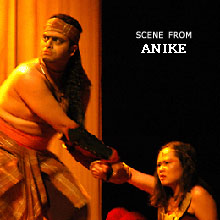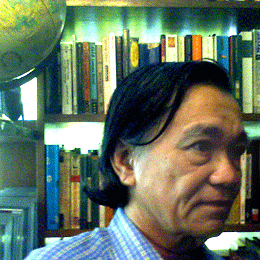
Wong Phui Nam: A Voice in the Wilderness
Banker-turned-poet Wong Phui Nam examines both his rootedness and his deracination. NOT many of us read poetry, let alone poetry written in English by a local. Perhaps we should.
Before anyone else across the border or in England or in the US asks if we have read Wong Phui Nam.
Other writers and poets describe him as a fine writer who has astonishing control of the language.
In his hands, words are not just tools.
They present our dilemmas in rich colours, shapes and textures whether he is stirring it in How The Hills Are Distant "like stones that drag the muddy bed".
Or taut with probing relationships in Remembering Grandma.
To poetry conscious minds, Wong is up there along with other modernist poets.
If T.S. Eliot gave us The Wasteland where ideas, people and civilisations clashed, then Wong made us aware of the Asian wasteland - a land of contradictions for the newly-arrived migrant and the colonial experience.
His collection of verse appear in How the Hills Are Distant (1968), Remembering Grandma and Other Rumours (1989), Ways of Exile (1993). The collections, together with some new pieces, appear in a new release An Acre of Day s Glass.
"He is an important post-colonial writer, not just in terms of the time he first began to write, but more in the sense of the material he wrote on such as the migrant and his link with the land," says Leonard Jeyam, an academic from Universiti Malaya who teaches Wong to students studying post-colonial literature.
The slightly built Wong with eager eyes is a quiet man, who chooses his words as carefully as if he was picking jewels from a Nepalese trader.
In a quiet and steady voice he explains, only occasionally allowing his hands to deliver a point about why he writes and why three generations of Malaysians won t be able to appreciate his work.
"I write in English and how many read in English or are even interested in poetry," he asks.
"We have lost three generations of Malaysians who studied in the national medium."
His own children who are part of those three generations have no interest in his poetry.
"They are fascinated, of course, to know that I write but we don't discuss my work."
The closest one to the arts is his youngest son, Qushairi who plays drums in a local pop rock band.
"My wife does ask me what I write about, but then again, we don't sit down to read poetry together."
Wong struggled in an Asian wasteland. On some days, he felt alien here. On other days, he felt intimately connected to Malaysia. He was born in Kuala Lumpur in 1935, a fifth generation Straits Chinese.
His struggle was with the identity of self, his roots, his ethnicity and even his choice of language.
Born to a poor family, in his early years he already could feel what it meant to be hungry or even foreign in his homeland.
Later, equipped with a colonial education of good grammar and literature at the Victoria Institution, he could articulate how he felt.
"At the University of Malaya in Singapore, we were not encouraged to write on this Asian experience in any creative form. We simply had to study English Literature, appreciate it and imitate it," says Wong whose famous peers include Singaporean poet Edwin Thumboo and Lloyd Fernando.
University was a trying period for Wong and he began to question the meaning of writing in English. He eventually graduated with a degree in Economics and went to work for a bank.
"Banking and finance wasn't a perfect world for a poet, it didn't have the atmosphere," says Wong, "but I continued to write."
1969 changed all that. He stopped writing.
"After May 13, the question of what language I was to write in was forcefully brought home to me. I no longer wanted to write, at least not in a language I was told was a colonial leftover.
"The National Language Policy and other policies on national unity, culture and economics made me reassess what I was doing. I began to question the validity of the language I was writing in."

The English in schools was replaced with Bahasa Malaysia as the medium of instruction. "I was despondent. This would make English language even more alien. I stopped writing."
It was his interregnum. He stopped writing for 15 years. That long spell made him think of language and its connections to people. After 15 years, he decided stop thinking about it and start writing again. In English.
"It so happened that Edwin Thumboo in Singapore was putting together some writing and asked me to contribute. I did," says Wong.
And that ended his literary exile. Wong's early works was mostly published in journals like New Cauldron, Seven Poets and The Second Tongue. Older Malaysians may recall some of his missives on language, poets and poetry that appeared in the newspapers in the 70s. In the 90s, Wong had a literary column in the New Straits Times.
"It wasn't easy writing a column, I remember rushing to meet deadlines and keeping up with ideas just to keep the column going," recalls Wong.
Again it was no mere column, it stirred the literati glitteratti and prodded sleepy university departments. Wong proceeded from week to week to keep the letters editor busy with issues.
The column, which ended in the late 90s, wore Wong out and he decided to return to the elegant pastime of writing verse.
In his house on an old hill in Kuala Lumpur crammed with books from Hinduism to German literature, Wong writes when he wants to.
"Words and ideas come to me at any time. It can even be while I'm driving or sitting on the potty. I then reach out for paper and write it out."
Set against his shelves is a cluttered writing table where he writes in long hand before using a computer.
"This has saved me much time," he says pointing to his computer. "Before that it was the typewriter where you can't just remove or correct lines as you wish."
Self-conscious of his writing in English, Wong now refers to his writing as educated Malaysian, a dialect with English roots.
Wong seems to have finally comes to term with his writing, having also completed a first Malaysian drama with its entire dialogue in verse Anike (published simultanenously with An Acre of Day s Glass).
Inspired by the subject of Sophocles' Antigone, Wong then turned to local history to present a classic expression of tyrannical rulers and the loyalty of subjects.
"It took me six months and I am pleased with the verse drama because before this I only attempted to write lyric or meditative poetry."
Now, it is all a matter for the public to rediscover reading and perhaps some long-overdue poetry.

Anak Bangsa Malaysia
by Ann Lee
See this faint-smelling curd still veined with blood
that I scrape in soft lumps from the insides of the head
with a bent spike and hook punched up the nostrils.
This was a web of live, coiled roots that reached
into nothing-darkness to draw up in its sap
spirit into the light of our common dream of the world
as pharaoh in it, owning the earth and sky,
and the river that by her teeming waters breeds
his people and in the fields and swamps as in the air,
his beasts and fowl. To these he added nights and days
founding the certainty of his claim on imperishable stone
that housed his place of burial, his mansion of the spirit
where he would prepare for his ascension to the sun.
And there ... Now flush the head out cleanly lest it stinks ...
- Excerpt from The Embalmer, in An Acre of Day's Glass: Collected Poems (Maya Press, 2006).
It's surely a big deal when a poet -- who, over the course of 50 years, has published four books of critically acclaimed poetry -- bursts in view with some new verse (sonnets, pulak!) and suddenly starts writing plays. Why the sudden prolificacy?
Three full-length plays, in as many years, and all of them conscious reworks of Greek myths in Malaysian terms? Talk about busy. Anike is based on Antigone, the woman who refuses to let her brother's body rot in public, despite an order from her king; Aduni is based on Medea, the woman who kills her own children; Darkfall, currently a work in progress, uses the myth of Hades.

ADUNI (in a rage)
Get out! Get out!
Crawl out of here! Get down on your belly,
and slither out in the dust in which you were hatched.
Get out before I trample your snake's head underfoot.
KAI JIN (sheepishly)
Do not say that I have not tried to be fair to you,
that I do not understand your need and tried to provide
for you to make a good start wherever you plan to go.
Do not regret that you spurned my offers when ...
ADUNI
Go! Go! Get out!
(Kai Jin leaves by the left of the stage. As he is leaving, Aduni speaks to herself.)
This is not a man. I can break him without a thought
as I can with a length of rotan a cobra's back.
(Lights down.)
This excerpt, from a draft of Aduni, was part of a public reading during the 2nd Kuala Lumpur International Literary Festival (KLILF) 2007, with the roles of Aduni and Kai Jin read by Shamala Palaniappan and Zahim Albakri, respectively. At the reading, literature critic Prof Lim Chee Seng went so far as to pronounce Aduni as "the most important new work in modern Malaysian theatre."
So, who's this poet and playwright?
It s Mohammed Razali Wong Phui Nam.
Bangsa Malaysia
50 years on, we may remember that one of the nine strategic challenges of Vision 2020 is to work towards being "bangsa Malaysia". Mahathir's challenge doesn't define what this means, of course, for we are to make what of it ourselves. It is difficult to define this elusive race / nationality, not least because we all have differing opinions about it (it may even be an unacceptable goal, according to some quarters). What might the image of bangsa Malaysia be?
At 72, Mohammed Razali Wong Phui Nam seems to have more energy and contradiction than ever. Retired economist and constant poet, he has fashionably longish hair - but with spectacles hung on a string round his neck, like an old school principal. For a Muslim, he sounds like a Buddhist. For a Baba, he sounds like a Nyonya. Under a Peranakan father, he learned Cantonese late, then English and Bahasa Melayu later. He speaks all three but writes mostly in English. A sometime Anglophobe and Anglophile, he refers to Greek, medieval, Malay and Cambodian myths and legends.
He even has a Muse. "She looks like a middle-aged Indian woman: gray hair, white sari ..."
Is it possible, as Razali grins from ear to ear, that here might be a mythical anak bangsa Malaysia? Not risen from the ashes, but landing suddenly, bloody and smiling, onto the aluminium operating table of Twin Towers-Malaysia, as if from nowhere, stunning the surgeons who were busy closing up the skull of muhibbah. He has come through some kind of portal! A motherlode of ancient Asian and world languages, without the seams showing. See how he flicks blood-red plasma off delicate eyelashes and sips teh tarik.
It turns out that Razali has had long absences before - such as between his first and second collections of poetry - so these sudden appearances of new work are simply the result of patient working away from the public eye. It is a return to celebrate, in Malaysia's fiftieth year.
Death in the Family
But first, some biodata, for he is no immaculate conception.
Wong Phui Nam was born in Kuala Lumpur, in 1935. (He has been a Muslim for 39 years, but has used his full name only recently, so as to give his children necessary legitimacy in case he dies. As will be seen, he does talk -- and laugh -- a lot about death.)
As a potted history, Phui Nam was educated in Kuala Lumpur's Chinatown and Batu Road School -- at one point, in fact, he was going to a Chinese-medium school in the mornings and an English one in the afternoons. In 1949, he went to the Victoria Institution. Later, he was accepted at the University of Malaya in Singapore for a BA (Hons) in Economics. After graduation, he joined the (then) Ministry of Commerce, and went on to a career in institutional merchant and industrial banking.
Wong's mother was from Nanhai, in Canton; she was a child when she "came as a package" to Malaya, with an aunt destined to wed a tin miner. When Phui Nam was four years old, his mother died of kidney failure.
"There used to be what we called a death-house on Jalan Sultan," he says. "It was a hospice. The dying were upstairs. The dead were downstairs. I remember seeing all these dead bodies -- and then my mother. It was a shock."
His father, a Peranakan turned Cantonese, "more Cantonese than the Chinese," died five years later in April 1944, during the Japanese Occupation.
His father's body was kept in the same death house. "I was sleeping," Phui Nam says. "At that time we lived on Galloway Road. Relatives suddenly arrived. In the dark, my brother took me to the death house. All those bodies again ..." Today, he still has nightmares "of coffins tipping over."
Abandonment, Loss and Death
Phui Nam, the eighth of 11 siblings, recalls an episode when his family was in mortal danger: "My father was an ARP, an Auxiliary Reserve Policeman. We were going to Singapore ... we reached Johor Bahru, but then had to run into the jungle. Near Ulu Tiram, we had to make a whole circle back around to avoid them." He adds, "It's true, they used to throw babies up and bayonet them. I remember dead bodies littered on the roadside."

Once, one of his sisters was nearly taken by soldiers. "She was dragged out, my stepmother bargaining with them, we were all there -- but then, the officer suddenly blew a whistle, and the soldiers left." On the streets, Phui Nam recalls that someone -- anyone -- could be suddenly asked to stand on a piece of rubber wood, and hold their bicycle up in the sun for hours.
"Recently, I was in Mid Valley Megamall," Phui Nam says. "I heard a group of Japanese men talking behind me, and I got the shivers."
It's not too much of a stretch to see the origins of abandonment, loss, death, and a greater quest as main themes in Phui Nam's poetry. Associate Professor Mohammad A Quayum, notes the "anxiety in the young boy which eventually filtered into his early poems."
Such rude awakening in childhood might well have found new oxygen in Phui Nam's sometimes bitter allusions to the birth of a country that held out hope to be "all things to all people" -- and then didn't, and rots instead. Many of the poems of Ways of Exile seem sick with disappointment. Still, all grist for the mill for the poet who has written or edited since young.
First an editor of his school magazine, Phui Nam then became an editor of The New Cauldron, UM Singapore's literary journal, and helped bring about two poetry anthologies: Litmus One: Selected University Verse, 1949 -1957 and Thirty Poems. He has translated various poems by Indonesian poet Chairil Anuar, Malaysian poet and painter Latiff Mohidin, and Tang Dynasty poets. Of the latter, Wong's short paper on his translation of a poem by Du Fu (Reading a Tang Poem, in An Acre of Day's Glass: Collected Poems) is illuminating. In the 1980s, he wrote a poetry column for the New Straits Times, as invited by the paper's (then) literary editor, Kee Thuan Chye.
Dark and Wonderful
Phui Nam's own poems from the 1960s appeared in Bunga Emas, edited by T Wignesan, and were republished in How the Hills are Distant (Tenggara Supplement, 1968). However, his best-known collections are Remembering Grandma and Other Rumours (National University of Singapore, 1989) and Ways of Exile (Skoob Books, 1993).
His body of work has received sound critical study, led by Lloyd Fernando, the novelist, playwright and former Head of English Literature at Universiti Malaya. In 1971, in a paper on "sectional and national literatures" presented originally in Bahasa Melayu at the Konggres Kebudayaan Kebangsaan, Fernando wrote that all of Phui Nam's poetry deals with "preparations for a kind of self-renewal. They take place in a luminous world just behind the scenes and are more related to a cryptic mood, rather than to the common processes of thought."
Elsewhere, Fernando writes that, although younger poets Pretam Kaur and Omar Mohamed Nor were noteworthy, Wong stands alongside Edwin Thumboo and Ee Tiang Hong as "the three outstanding names in the first generation" of Malaysian poets in English. Of Remembering Grandma and Other Rumours (1989), Fernando reckoned it "one of the first efforts to get to grips with -- rather than moan about -- the 'detribalisation' anxiety that has dogged the Malaysian writer for years."
In an essay published in 2001, Chin Woon Ping also remarks of Remembering Grandma that "the thematics of estrangement and exile found in Wong's earlier work -- familiar topoi of the diasporan culture of Malaysian Chinese -- are clarified in recurrent, one might say obsessive symbols of pathology." Singaporean playwright, Robert Yeo identifies Phui Nam's work as "bleak preoccupations with physical and spiritual decay, death and possible resurrection." Critic, poet and arts-activist Eddin Khoo says: "Dark and wonderful, especially his new work."
The Point of No Return
But what does Phui Nam say, himself, about the clear and present sense of death in his work?
"Some people call it morbid," he smiles, "But that's looking at things from the Western viewpoint."
Western viewpoint? This is surely limiting, even disingenuous, for the very power of many poems come from their instilling a queasy, uneasy fear -- whether one's stomach lies north, south, east or west. What of the Irish love of a wake, where death is to be celebrated -- or the Mexican festival of death? There is no common squeamishness about open caskets there, there in the Far West. And how many cousins and relatives in this land, here and now, won't step foot in a house if someone has died in it? Morbidity is surely not just a Western thing.
And yet, Phui Nam does mean death in an uncommonly bright light. While his vision has seemed bitter, at times, it has never been entirely apocalyptic. There is usually a search in his work -- an optimistic one, as it looks for something Other Than. The embalmer's mummy is, in death, ascending into the sun.
With this recent cycle of creativity, Razali / Phui Nam's new work suggests he has "moved on", gone deeper, into a certain fluency (applying himself to the discipline of sonnets again, changing tack to write plays in verse) and deeper into familiar, yet extended, mythical territory (he has always made references to Greek, Chinese, Malay and Christian myths; one of his new plays is set in "pre-Islamic" times). Perhaps, to use K S Maniam's choice phrase for the struggle of the Malaysian writer, our poet has "reached the point of no return in terms of linguistic choice."
Mindfulness
But if Mohammed Razali Wong Phui Nam is an anak bangsa Malaysia, and references like "rotan", "cobra" and "Tuanku" physically locate him here, what about his literary pharaohs and other adventures? Consider these: Beethoven and Mozart. (Razali's first passion was music, and he played the violin for a while. "But it was cheaper to have a pencil and paper," he says. His earliest sense of beat and rhythm is derived from these musical beginnings.)
Other adventures have been taken through Keats, Edwin Thumboo, Dylan Thomas, T S Eliot, Robert Graves, St John of the Cross, Walt Whitman, Hart Crane, Wallace Stevens, John Donne, Shakespeare ... together with translations of works by Chairil Anuar, Latiff Mohidin and Tang poets, this is some journeying.
Towards the end of our afternoon conversation, the poet and playwright sighs. "I'm older than the country." He claims "this generation" has been "maimed."
How? "By being deprived of global language," Razali says. "We are a nation of mediocrity."
Yet, it seems, we must not look to the future with fear. Razali later relates the four Noble Truths of Buddhist belief: Life Means Suffering, "Dhukka". The Origin of Suffering is Attachment. The Cessation of Suffering is Attainable. There is a Path to the cessation of Suffering, using the Eight-Fold Path.
Then he adds: "It's true, you know. There is so much suffering. But I do believe that we can behave better to one another. In the Eight-Fold path, for example, it says people must be mindful. Mindfulness is very important in our context."
He shifts in his aluminium seat. "We are preparing for death, you see," he says, smiling again, "But, of course, I don't know what it's going to be like." His face, in repose, is quizzical, yet nonplussed. An eyelash has fallen on his right cheek.
Ann Lee is a writer and director. Educated in Sandakan, Penang, Colwyn Bay and Oxford, she has been writing on the arts, off and on, for the last 20 years. She has a degree in Film and another in the History of Science, Medicine and Technology.
 The V.I. Web Page
The V.I. Web Page